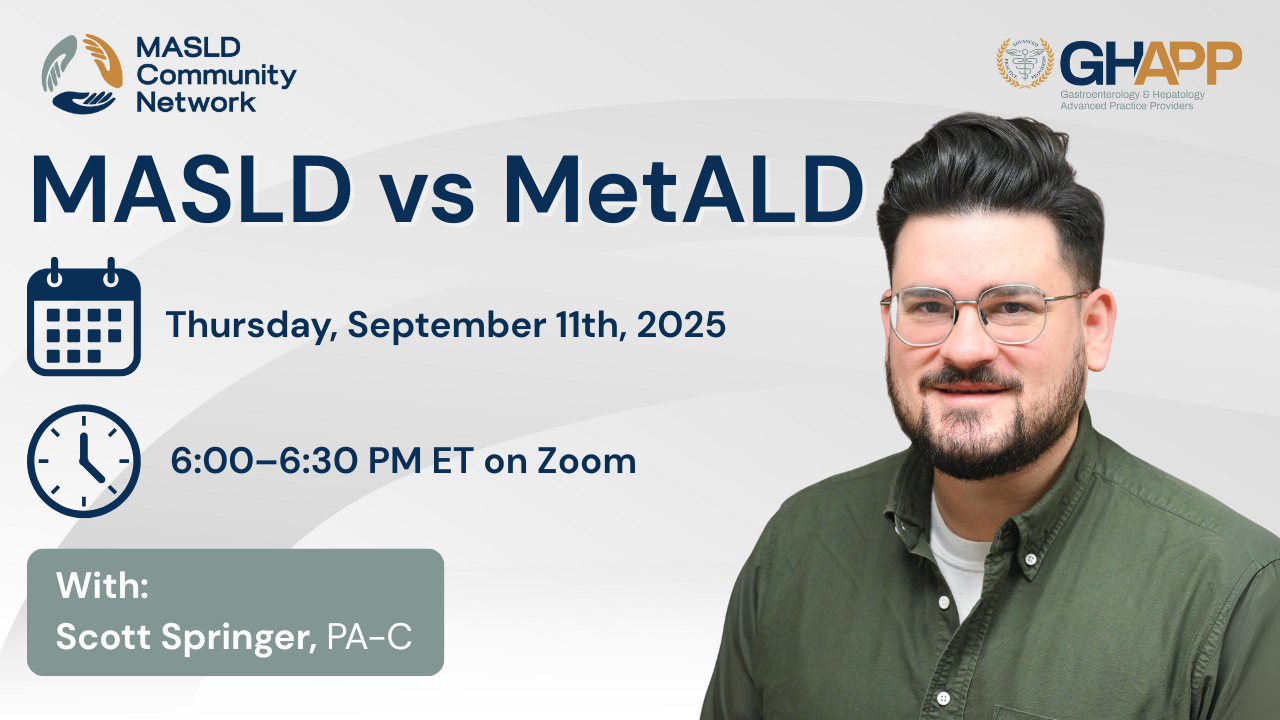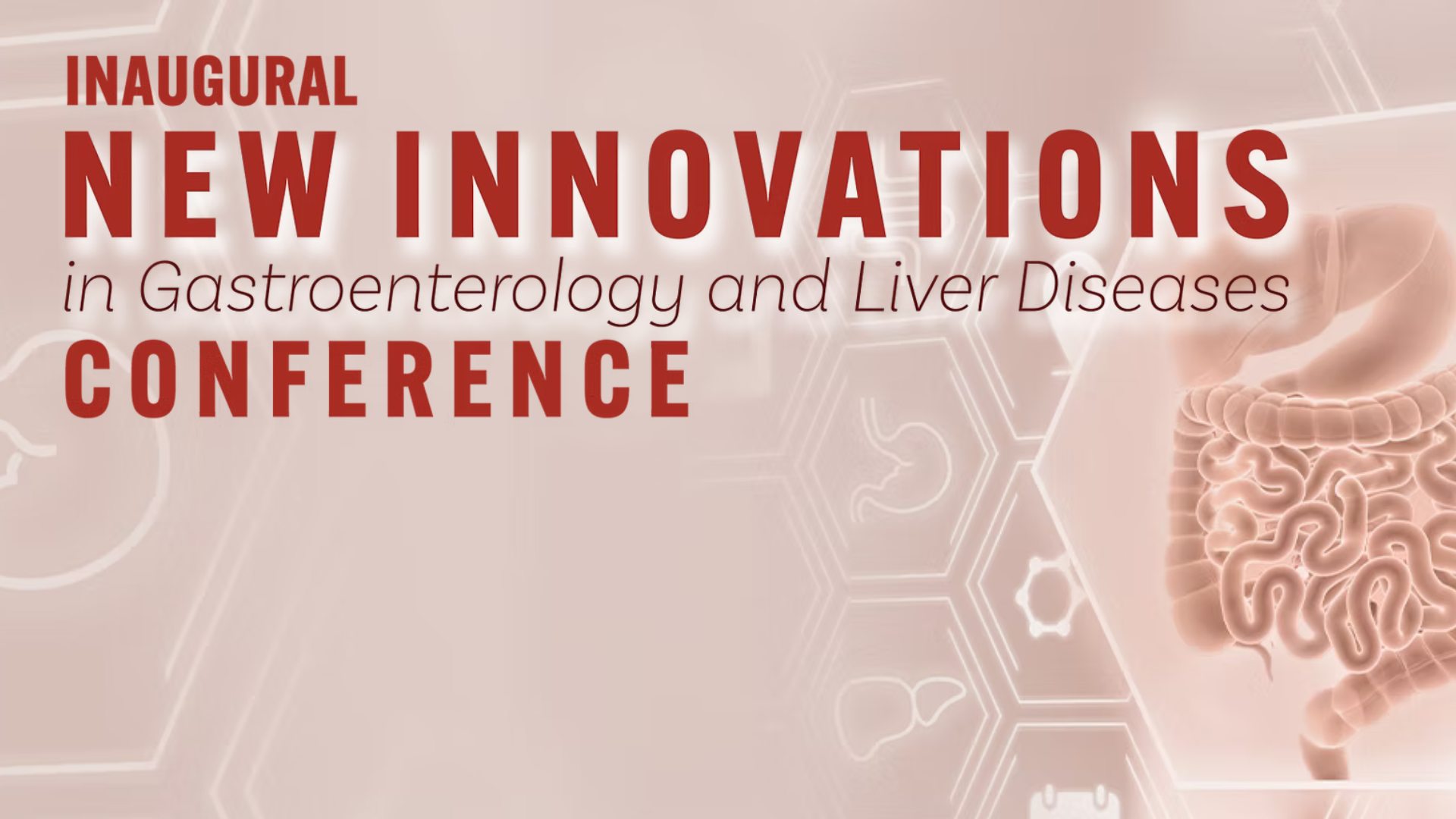
Scott Springer
PA-C, MPAS
Location : Buffalo, NY, USA
BIO
Scott R. Springer is a certified physician assistant at ECMC’s Center for Hepatology Care in Buffalo, NY, also known as “La Bodega”. He cares for patients with liver disease and substance use disorders. Scott has presented on MASLD, alcohol-associated liver disease, and viral hepatitis at the local, state, and national levels and precepts medical providers and PA students from throughout New York State. Scott is a founding member of ECMC’s Harm Reduction Coalition and has been named an 2024 Emerging Liver APP by the American Association for the Study of Liver Disease.
MASLD-MASH Content Featuring Scott
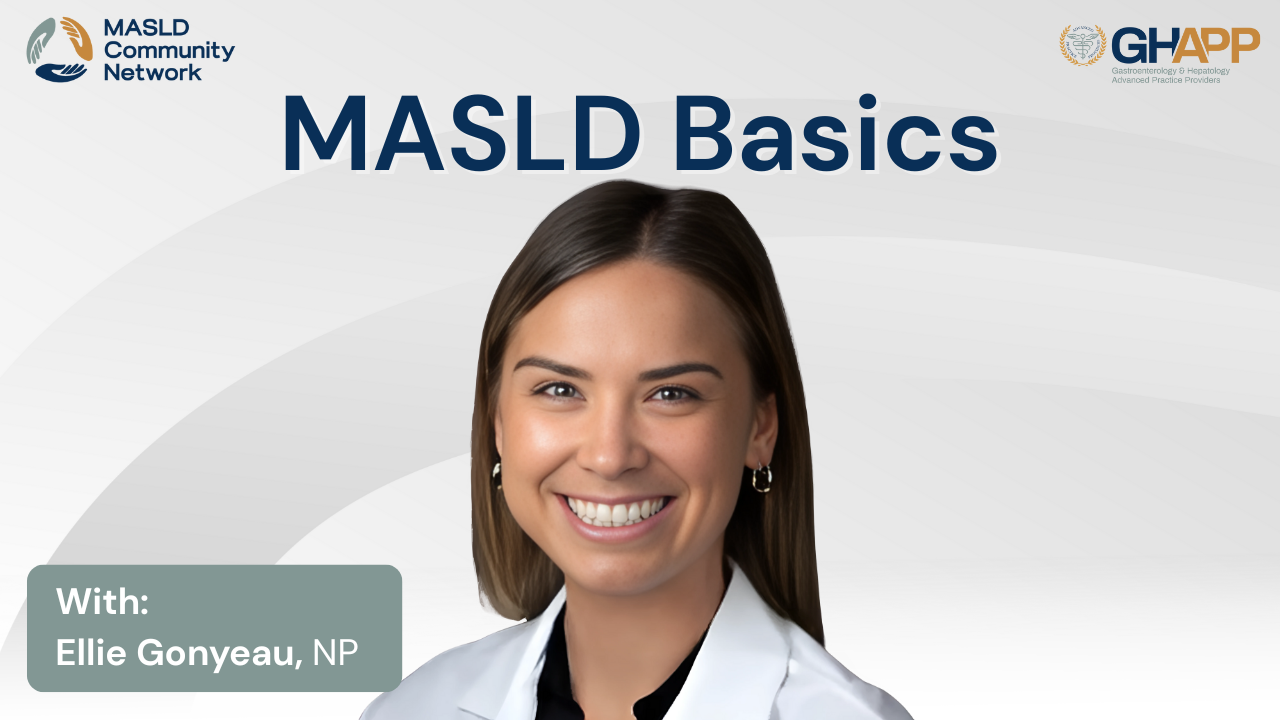
MASLD Basics With Ellie Gonyeau

Join Ellie Gonyeau, NP, a GI and hepatology nurse practitioner at Beth Israel Deaconess Medical Center in Boston, for a foundational overview of Metabolic Dysfunction-Associated Steatotic Liver Disease (MASLD), formerly known as NAFLD. Presented through the GHAPP MASLD Community Network and sponsored by Madrigal Pharmaceuticals, this session covers the latest updates in MASLD nomenclature, diagnostic criteria, and non-invasive evaluation strategies. Ellie walks through the 2023 guidelines, emphasizing how MASLD is defined by hepatic steatosis in the presence of at least one metabolic risk factor—such as obesity, type 2 diabetes, hypertension, or dyslipidemia—and the importance of ruling out excessive alcohol use and other causes of chronic liver disease. Using real-world case examples like "JP", Ellie illustrates how to assess disease severity using tools such as FIB-4, FibroScan, and lab workups, while explaining when to consider specialty referral, further imaging, or liver biopsy. The talk also highlights the alarming rates of MASLD in high-risk populations, such as the Latin American community, and explores the disease's potential to silently progress to MASH, fibrosis, or cirrhosis. Whether you're in primary care, GI, or hepatology, this session provides critical insights on early detection, risk stratification, and guideline-based management of this increasingly prevalent condition.
Watch Now
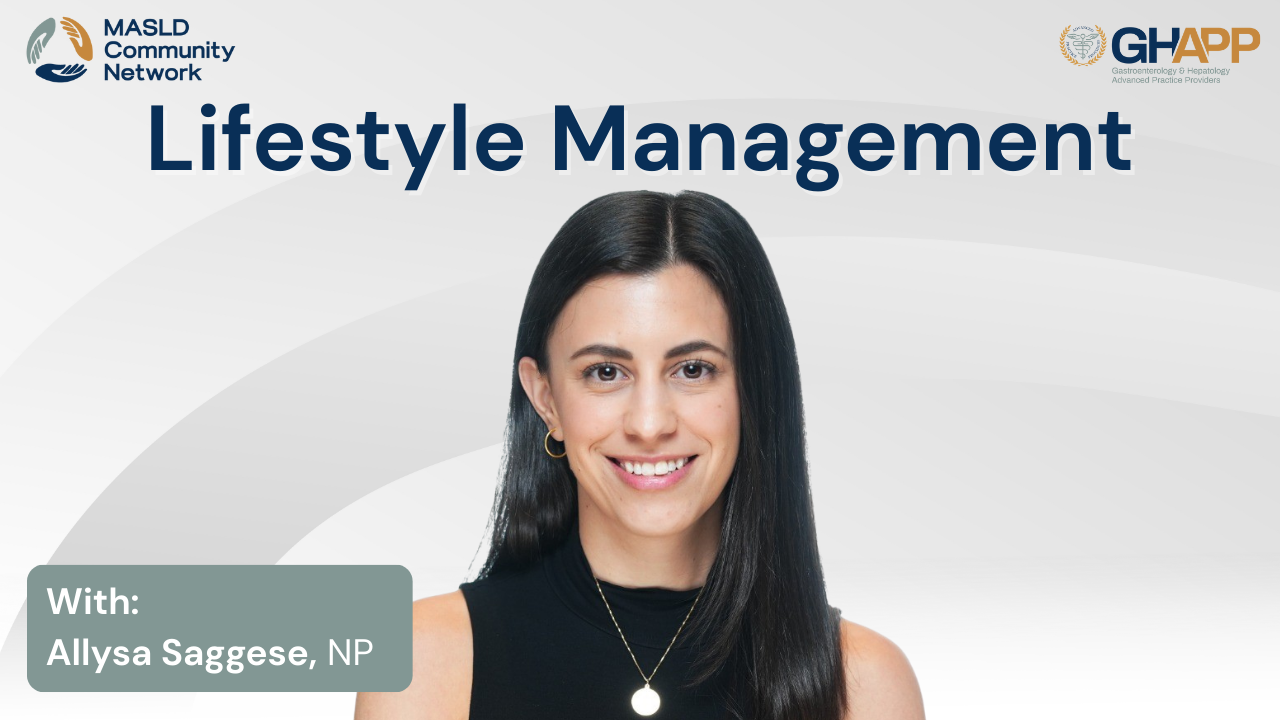
Lifestyle Management With Allysa Saggese

Join Allysa Saggese, NP, from Weill Cornell Medicine in New York City, for an insightful and practical discussion on lifestyle management for MASLD and MASH, presented through the GHAPP MASLD/MASH Community Network, sponsored by Madrigal Pharmaceuticals. In this case-based presentation, Allysa walks viewers through the non-pharmacologic strategies used to manage Metabolic Dysfunction-Associated Steatotic Liver Disease (MASLD), highlighting the role of nutrition, physical activity, and patient-centered counseling. Using a real-world example of a 65-year-old patient with obesity, diabetes, and steatosis, Allysa demonstrates how to assess fibrosis risk through non-invasive testing like FIB-4 and FibroScan, and explains how lifestyle modifications remain central to slowing disease progression—even in the era of advanced therapeutics. The session explores the importance of motivational interviewing, cultural dietary preferences, and how to structure effective, individualized conversations around reducing sugar intake, increasing movement at home, and achieving sustainable 5–10% weight loss to improve liver histology. Allysa also breaks down the metabolic interplay between central adiposity, insulin resistance, and liver inflammation, and shares counseling tips to build patient trust and long-term engagement. Whether you're a GI or hepatology provider, this session delivers real-world guidance to help empower patients to reverse early liver damage through everyday lifestyle changes.
Watch Now

APP Insight: Misconceptions About Liver Health

In this video, Scott Springer, PA-C, from Erie County Medical Center in Buffalo, NY, addresses one of the most common misconceptions in liver health—trusting over-the-counter supplements and detox products to improve liver function. Drawing from his experience in both hepatology and addiction medicine, Scott emphasizes that many non-prescribed products marketed for liver support are not only ineffective but can actually cause liver harm. He cautions against relying on unregulated supplements and urges patients to consult medical professionals before taking anything for liver health. One surprising and evidence-based recommendation he makes: drink coffee. Filtered coffee, in particular, has been shown to support liver health and may reduce the risk of liver disease progression. Scott recommends two to three cups per day, without added sugar or excess dairy—especially for patients with MASLD or MASH. This video offers practical, research-backed advice for patients and providers alike, highlighting what truly helps (and what may harm) the liver.
Watch Now

Management of Life Style Modification

This video focuses on the comprehensive management of patients with metabolic-associated steatohepatitis (MASH), emphasizing lifestyle modifications, dietary adjustments, and exercise strategies. Key topics include the importance of addressing risk factors like diet, exercise habits, and alcohol intake, as well as referrals to medically supervised weight loss clinics or bariatric surgery for advanced cases. The speaker highlights the benefits of the Mediterranean diet, intermittent fasting, and avoiding ultra-processed foods while discussing the role of resistance training to combat sarcopenia and maintain muscle mass. Practical advice and tailored recommendations ensure a holistic approach to managing MASH and improving patient outcomes.
Watch Now

Third Step of Life Style Management

This video provides a comprehensive overview of emerging pharmacologic treatments for metabolic-associated steatohepatitis (MASH) and their tailored applications based on patient profiles. Topics include FDA-approved therapies, drugs in advanced clinical trials (such as semaglutide and lanifibranor), and the potential for combination treatments targeting both steatohepatitis and fibrosis. The speaker emphasizes the importance of patient-specific approaches considering metabolic profiles, obesity, and diabetes status, alongside lifestyle interventions. Additionally, the video discusses the evolving interdisciplinary care model and highlights the exciting progress in non-invasive testing and treatment advancements for F2-F3 fibrosis.
Watch Now

Approved Medication for MASH/NASH

This video provides detailed guidance on selecting and monitoring patients for emerging therapies targeting advanced fibrosis (F2-F3) in NASH. Key topics include contraindications for patients with cirrhosis, considerations for concomitant medications, and dose adjustments for statins. The video outlines ideal candidates based on specific thresholds for VCTE, MRE, ELF scores, and other non-invasive tests while emphasizing the importance of ruling out portal hypertension and other liver diseases. It also reviews a stepwise monitoring approach, focusing on tolerability at three months and efficacy assessments at six and twelve months, with an emphasis on histologic and non-invasive test improvements.
Watch Now

Types of Diet for the Treatment of MASLD

This video explores comprehensive strategies for managing metabolic-associated steatohepatitis (MASH), focusing on fibrosis risk stratification, lifestyle modifications, and pharmacologic interventions. Learn about dietary recommendations like the Mediterranean diet, exercise guidelines emphasizing resistance training, and the role of intermittent fasting and processed food avoidance. The video also highlights weight loss targets, diabetes management, and emerging therapies such as GLP-1 receptor agonists and bariatric surgery, all aimed at improving liver health and patient outcomes.
Watch Now

NITs to Identify High Risk MASH Patients

Explore advancements in non-invasive diagnostics and risk stratification for liver fibrosis and MASH. This video highlights tools like FIB-4, transient elastography, and innovative scoring systems (e.g., FAST and Agile) to identify and predict outcomes for high-risk patients. Learn about serum biomarkers, updated guidelines, and the role of lifestyle interventions alongside targeted therapies for managing metabolic risks and advancing care in hepatology.
Watch Now

Practical Techniques for Lifestyle Adherence

In this episode, Emily Przybyl, PA-C at Erie County Medical Center in Buffalo, NY, dives into the foundations of motivational interviewing for patients with MASLD (metabolic dysfunction-associated steatotic liver disease) and MASH. With practical, real-world insights from her clinical experience, Emily shares how providers can build trust, meet patients where they are, and guide them toward meaningful, sustainable lifestyle changes. She emphasizes asking open-ended questions, assessing social determinants of health like income and food access, and collaboratively developing realistic diet and exercise plans tailored to each patient’s circumstances. Emily also highlights culturally sensitive counseling techniques, strategies for overcoming barriers like limited mobility or unsafe environments, and the importance of setting SMART goals for weight loss and liver health. Whether patients are struggling with motivation, resistant to change, or unsure where to start, this episode provides a supportive, patient-centered framework for fostering long-term behavior change in metabolic liver disease.
Watch Now

Non-Invasive Testing With Elizabeth Alqueza

In this session, Elizabeth Alqueza, PA-C at Beth Israel Deaconess Medical Center, provides a comprehensive overview of non-invasive testing in patients with Metabolic Dysfunction–Associated Steatotic Liver Disease (MASLD) and MASH. Using a real clinical case, she explains how to evaluate patients with abnormal liver enzymes and steatosis on imaging, and how to apply widely used tools such as the FIB-4 score, ELF test, FibroScan (VCTE), CAP score, shear wave elastography, and MR elastography. Elizabeth highlights the strengths, limitations, and interpretation of each test, along with practical considerations like cost, accessibility, patient factors, and operator experience. She also reviews the MASLD care pathway, emphasizing how accurate staging with non-invasive tests helps identify at-risk patients with advanced fibrosis who need closer monitoring, lifestyle interventions, and specialty referral. This talk underscores the critical role of non-invasive assessment in preventing progression to cirrhosis, liver failure, and hepatocellular carcinoma.
Watch Now

MASLD Basics With Scott Springer

Welcome to the GHAPP MASLD Community Network, where Scott Springer, PA-C, from Erie County Medical Center in Buffalo, NY, provides a comprehensive overview of the evolving landscape of steatotic liver disease. Sponsored by Madrigal Pharmaceuticals, this session breaks down the recent nomenclature shift from NAFLD/NASH to MASLD (Metabolic Dysfunction-Associated Steatotic Liver Disease) and MASH (Metabolic Dysfunction-Associated Steatohepatitis). Scott explores how overlapping etiologies like alcohol-associated liver disease (ALD) and the emerging classification of MetALD better reflect real-world patient populations. Learn about key diagnostic strategies—including the use of FIB-4, ELF score, and transient elastography—to assess fibrosis risk and guide referral to hepatology care. With a clinical case study, Scott highlights the importance of accurate staging, ruling out alternative etiologies, and understanding progression rates in high-risk patients. This session is a must-watch for GI and hepatology APPs looking to stay updated on guidelines, non-invasive diagnostics, and best practices for managing MASLD/MASH in primary and specialty settings.
Watch Now
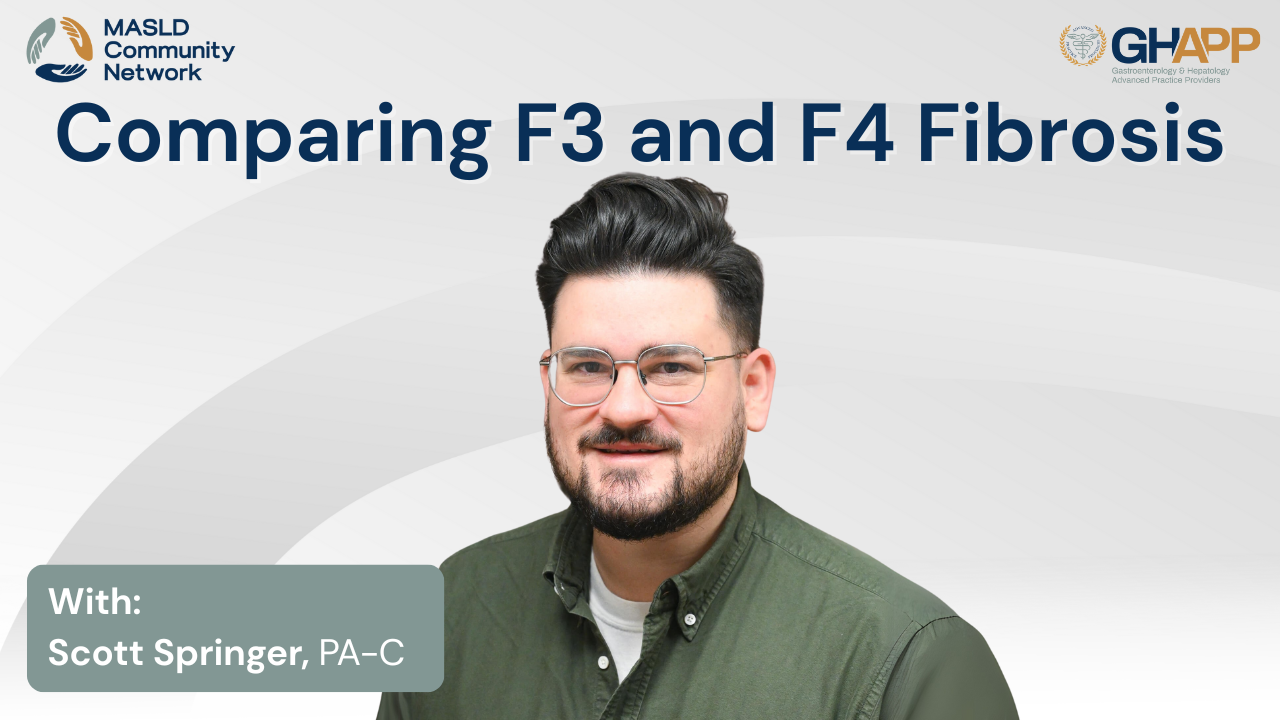
Comparing F3 and F4 Fibrosis With Scott Springer

Join Scott Springer, PA-C, from Erie County Medical Center in Buffalo, NY, for a case-based clinical discussion on how to evaluate and manage F3 vs. F4 fibrosis in patients with Metabolic Dysfunction-Associated Steatotic Liver Disease (MASLD) and MASH, presented through the GHAPP MASLD/MASH Community Network and sponsored by Madrigal Pharmaceuticals. Using a detailed side-by-side comparison of a fictional patient "Sam," Scott demonstrates how to interpret key non-invasive testing modalities—including FIB-4, ELF, and FibroScan—to stage liver fibrosis, determine candidacy for emerging therapies like resmetirom (Rezdiffra), and identify when liver biopsy may still be necessary. Learn how changes in platelet count, ELF score, and liver stiffness (kPa) help distinguish advanced fibrosis (F3) from cirrhosis (F4) and how this affects treatment decisions, HCC surveillance, and portal hypertension management. Scott also emphasizes the role of GLP-1 therapy, aggressive cardiometabolic risk reduction, and lifestyle counseling as core strategies in MASLD care. This session is a practical guide for GI and hepatology providers navigating MASLD staging, treatment eligibility, and long-term monitoring in 2025 and beyond.
Watch Now

Podcast: Alcohol and MASLD/MASH: Navigating the Complex Relationship

In this powerful and highly educational episode, Scott Springer, PA-C at Erie County Medical Center in Buffalo, NY, explores the complex and often overlooked relationship between alcohol use and metabolic dysfunction–associated steatotic liver disease (MASLD/MASH). Drawing from his dual expertise in hepatology and addiction medicine, Scott outlines the importance of accurately assessing alcohol use when diagnosing MASLD, MASH, MetALD, or ALD—emphasizing that MASLD and MASH are diagnoses of exclusion and heavily influenced by alcohol consumption thresholds. He discusses best practices for screening, including patient-centered, nonjudgmental interviewing, the use of biomarkers like PEth and urine ethyl glucuronide, and how these tools enhance accuracy and accountability in care. Scott reviews national guidelines that recommend alcohol abstinence for patients with chronic liver disease and presents data showing how even small reductions in alcohol use can significantly lower the risk of cirrhosis. He also unpacks the challenges of interpreting liver tests in patients with ongoing alcohol use, the limitations of non-invasive testing like FibroScan and FIB-4, and how alcohol may disqualify patients from emerging pharmacotherapy such as resmetirom. Finally, he highlights the promising potential of GLP-1 medications in managing both liver fibrosis and alcohol use. This episode is essential listening for hepatology providers, addiction specialists, and any clinician involved in the care of patients with coexisting liver disease and substance use disorders.
Watch Now
FAQ's

APP Insight: Misconceptions About Liver Health

In this video, Scott Springer, PA-C, from Erie County Medical Center in Buffalo, NY, addresses one of the most common misconceptions in liver health—trusting over-the-counter supplements and detox products to improve liver function. Drawing from his experience in both hepatology and addiction medicine, Scott emphasizes that many non-prescribed products marketed for liver support are not only ineffective but can actually cause liver harm. He cautions against relying on unregulated supplements and urges patients to consult medical professionals before taking anything for liver health. One surprising and evidence-based recommendation he makes: drink coffee. Filtered coffee, in particular, has been shown to support liver health and may reduce the risk of liver disease progression. Scott recommends two to three cups per day, without added sugar or excess dairy—especially for patients with MASLD or MASH. This video offers practical, research-backed advice for patients and providers alike, highlighting what truly helps (and what may harm) the liver.
Watch Now






